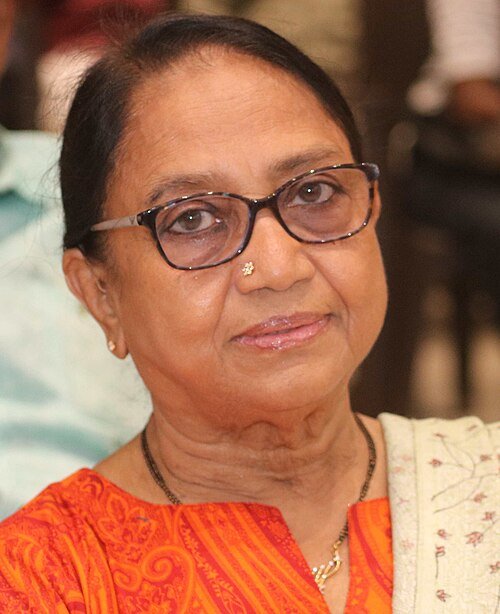“This book was born from the belief that no story is ever small; that in the tapestry of human experience, every thread holds the weight of the whole.” – Banu Mushtaq

Dear WorkWell Warriors,
This week, we celebrate Banu Mushtaq, the 77-year-old writer, activist, and lawyer who just made history by becoming the first Kannada-language author to win the prestigious International Booker Prize for her collection “Heart Lamp.” But Banu’s story isn’t just about literary success, it’s about a woman who found her voice in the darkest moments of her life and transformed her pain into purpose.
When Life Felt Impossible
Think about it: You’re 29, a new mother battling postpartum depression, confined to the four walls of your home after a love marriage that promised freedom but delivered restrictions. You’re told to wear a burqa and dedicate yourself only to domestic work. The dreams you once had seem impossibly distant.
This was Banu’s reality. In her own words: “I had always wanted to write but had nothing to write about because suddenly, after a love marriage, I was told to wear a burqa and dedicate myself to domestic work. I became a mother suffering from postpartum depression at 29.”
The despair became so overwhelming that one day, in a moment that could have ended everything, she poured petrol on herself, ready to set herself on fire. It was only her husband’s quick intervention and the sight of their baby that stopped her.
The Turning Point: When Pain Becomes Purpose
But here’s where Banu’s story becomes a beacon of hope for every woman who feels trapped, voiceless, or forgotten: She turned to writing to explore her feelings and experiences. At 29, when many women might feel it’s “too late” to start something new, Banu picked up her pen and began to write.
She didn’t start with grand ambitions or perfect conditions. She started with her truth, the struggles of being a woman, a mother, a person trying to find herself within the constraints society had placed around her.
Courage in the Face of Danger
Banu’s journey was not just overcoming personal struggles, it required immense physical courage too. When she began advocating for Muslim women’s rights, including their right to pray in mosques, she faced:
- A three-month social boycott of her entire family in 2000
- Menacing telephone calls
- A knife-wielding attacker (thankfully thwarted by her husband)
- A fatwa issued against her
Yet she never stopped writing. She never stopped speaking her truth.
From Journalist to Lawyer to Literary Legend
Banu didn’t follow a linear path. She worked as a reporter for a decade, then became a lawyer to support her family financially. She served two terms on the Hassan City Municipal Council. Through it all, she kept writing, over 60 stories across six decades.
Her persistence paid off. Before her Booker win, she had already received the Karnataka Sahitya Academy Award, the Daana Chintamani Attimabbe Award, and in 2024, the PEN Translation Prize.
What We Can Learn from Banu’s Journey
For every woman sitting at home, wondering if it’s too late to pursue her dreams:
- Age is just a number: Banu didn’t become a published writer until 29, didn’t achieve international recognition until 77. Your timeline is your own.
- Start where you are: You don’t need perfect circumstances. Banu started writing in the midst of postpartum depression, family restrictions, and societal pressure.
- Your struggles are your strength: The very experiences that feel like roadblocks can become the foundation of your purpose. Banu’s personal struggles with patriarchy and religious conservatism became the heart of her award-winning stories.
- One voice can create change: Banu’s characters are described as “astonishing portraits of survival and resilience”—because they’re born from her own survival and resilience.
- Persistence pays off: It took decades for Banu to achieve international recognition. Every “no,” every setback, every threatening phone call was just a stepping stone to her ultimate triumph.
A Message for Today’s Women
Banu Mushtaq’s journey reminds us that no matter how trapped you feel today, your story isn’t over. Whether you’re battling postpartum depression, feeling confined by societal expectations, or simply wondering if you have something valuable to contribute to the world—remember Banu’s words: “No story is ever small.”
Your voice matters. Your experiences matter. Your dreams, no matter how long they’ve been deferred, still matter.
In a world that often tries to silence women, especially those from marginalized communities, Banu Mushtaq stands as proof that our stories have the power to cross borders, languages, and barriers. They have the power to win the world’s most prestigious literary prizes.
But most importantly, they have the power to inspire other women to find their own voices, pick up their own pens, and add their threads to the tapestry of human experience.
So today, we salute Banu Mushtaq, not just as an International Booker Prize winner, but as a woman who refused to let circumstances define her destiny. She turned her darkest moments into light for others, her personal struggles into universal stories of hope.
What’s your story? What thread will you add to the tapestry?
Keep working, keep believing, keep writing your own story.
